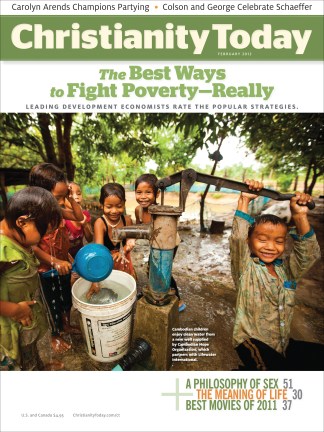Johnnie Moore was only 14 when he first stayed in the dorms at Liberty University, and since then, he's pretty much remained at the school that Jerry Falwell founded 41 years ago in Lynchburg, Virginia. Moore and his single-mom family briefly lived in the dorms after his parents' divorce and a temporary stretch of homelessness; now 28, the Liberty grad spends much of his time at the school as a campus pastor, shepherding students in the faith and in missions.
When Moore's parents split—and when the pastor who urged them to stay together was later found guilty of adultery with another pastor's wife—Moore's faith was rocked. But today he says his doubts helped him work through some hard questions and ultimately claim his parents' beliefs as his own. He chronicles that story in Honestly: Really Living What We Say We Believe (Harvest House), which National Association of Evangelicals president Leith Anderson calls "first-century Christianity in 21st-century narrative."
In the book, Moore tackles issues of pharisaism—in the church, in politics, in everyday life. He's acutely aware of the irony of a hypocrite opining on the topic: "One reason I wrote it is because I was disappointed with my own hypocrisy. I'm the first to admit it. I'll probably be a hypocrite five times again before next week, or by the end of the day."
How did you end up as a campus pastor?
When I was a student at Liberty, I heard Jerry Falwell ask in a sermon: "What would you do if you knew you wouldn't fail?" It was a vision question. I told him after the service, "Dr. Falwell, I would try to reach the other [secular] colleges and students in Lynchburg with the gospel." We scheduled a meeting and talked about it, and a year later, while I was still an undergrad, he asked me to become a campus pastor.
What's the best part of that job?
Missions trips. I oversee our Center for Global Engagement, and we send students all over the world. At heart I'm a missionary, and I really think this is the first generation that can realistically complete the Great Commission. This year, we'll have students doing dental clinics in the Amazon, doing trauma counseling in Rwanda, working with war widows in Bosnia, and working in India and some closed countries.
Anything stand out on one of those trips?
In 2004, we were at a Bible school graduation in India, and I witnessed 2,400 graduates take a martyr's oath before receiving their diploma. They all stood up and said they were willing to be poor and even to die for Jesus, and then they were sent out as missionaries. That changed my life and sparked my love for missions.
Your book says doubt is a good thing. Why?
A lot of Christians grow up thinking doubt is a disease, but I believe it's a healthy phase in spiritual development, if it's dealt with wisely. Doubt forces us to own our faith. God doesn't have any grandchildren; you don't inherit Christianity from Mom or Dad. God only has sons and daughters. You've got to get it for yourself. Doubt forces us to figure out what we believe, not just what our family or church or culture believes.
More: Liberty.edu, JohnnieMoore.org
Copyright © 2012 Christianity Today. Click for reprint information.
Related Elsewhere:
Honestly: Really Living What We Say We Believe is available from ChristianBook.com and other book retailers.
Learn more about Johnnie Moore and Liberty University at their respective websites.
Previous "Who's Next" sections featured Bethany Hoang, Bobby Gruenewald, Julie Bell, DeVon Franklin, Shannon Sedgwick Davis, Jon Tyson, Jonathan Golden, Paul Louis Metzger, Amena Brown, David Cunningham, Timothy Dalrymple, John Sowers, Alissa Wilkinson, Jamie Tworkowski, Bryan Jennings, L. L. Barkat, Robert Gelinas, Nicole Baker Fulgham, and Gideon Strauss.










